- A binary search tree is
an ordered tree where
each internal node has
at most 2 children nodes
Example:
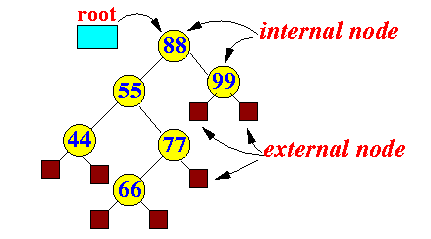
Note:
- Each internal node
has exactly 2 (internal or
external) child nodes
- External nodes
have 0 children nodes
(they are "terminal nodes")
(External nodes are often simply a null value :-))
- Each internal node
has exactly 2 (internal or
external) child nodes
- Multiway trees:
- A multiway (m-way) search tree is
a generalization
of the binary search tree....
- Each internal node
of a m-way tree has
exactly m (internal or external)
children nodes
- External nodes
have 0 children nodes
(they are "terminal nodes")
(External nodes are often simply a null value :-))
- Each internal node
of a m-way tree has
exactly m (internal or external)
children nodes
Example: a 4-way tree
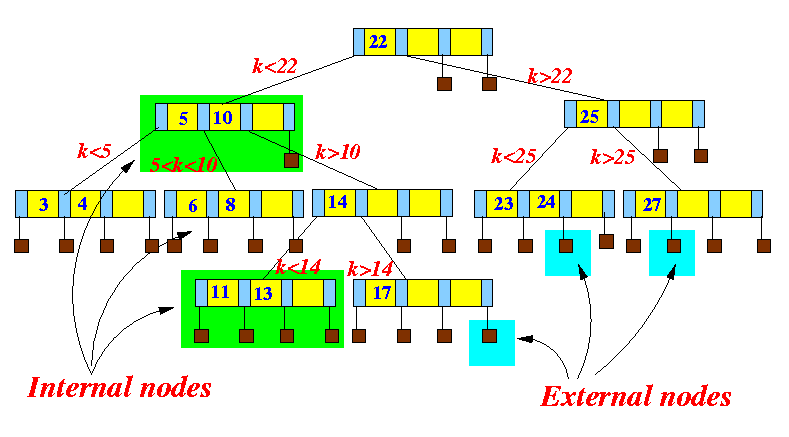
Notice that:
- Each internal node has
4 (internal or external) child nodes
- External nodes has no children
- A multiway (m-way) search tree is
a generalization
of the binary search tree....
- Terminology:
d-node
(d ≤ m)
- A d-node =
a node with
d
internal children nodes
Each d-node contains:
- d
references (pointers) to
d subtrees
(= children nodes)
- d − 1
(key, value) pairs
(k0, v0),
(k1, v1),
...
(kd-2, vd-2)
such that:
-
k0 < k1
< ... < kd-2
- d
references (pointers) to
d subtrees
(= children nodes)
- A d-node =
a node with
d
internal children nodes
- Graphical depiction
of a d-node
(they say that a picture is worth 1000 words....):
- A d-node
has d subtrees
organized by
d−1 keys:

- Keys in left most subtree must be < k0
- Keys in subtree sandwiched between k0 and k1 must have values between k0 and k1
- Keys in subtree sandwiched between k1 and k2 must have values between k1 and k2
- ...
- Keys in right most subtree must be > kd−2
Example:
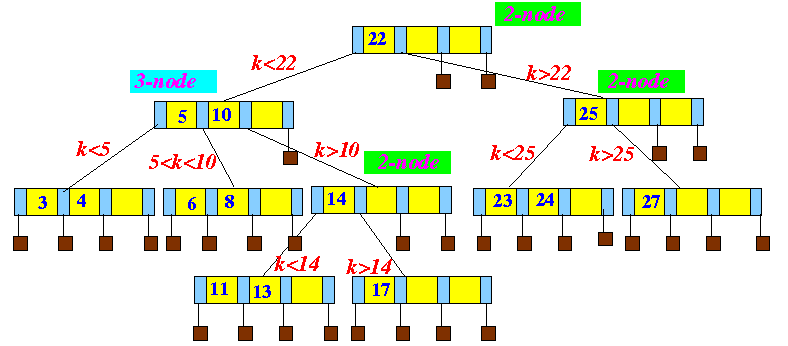
- A d-node
has d subtrees
organized by
d−1 keys:
- Leaf node have
zero (0) internal child nodes
(i.e., no subtrees)
Example:

- Internal nodes have
≥ 2 internal child nodes
(i.e., ≥ 2 subtrees)
Example:

- However:
- There are no nodes that
has exactly one internal child node
(exactly 1 subtree) !!!
- An internal node will
never have
just one (1) subtree !!!
An internal node will always have 2 or more subtrees
(You will see that the node insertion/deletion algorithm will create such a tree !!!)
- An internal node will
never have
just one (1) subtree !!!
- There are no nodes that
has exactly one internal child node
(exactly 1 subtree) !!!
- Each node contains:
- d subtree references
- d−1
keys (and possibly associated values)
- 1 reference to the parent node !!!
- Variables:
public class Entry { public String key; // Again, I use concrete data types.. public Integer value; public Entry(String k, Integer v) { key = k; value = v; } }
public class Node { public Entry[] e; // Keys and its associated values public Node[] child; // Subtrees public Node parent; // the parent node ... }Correspondence of the variables:
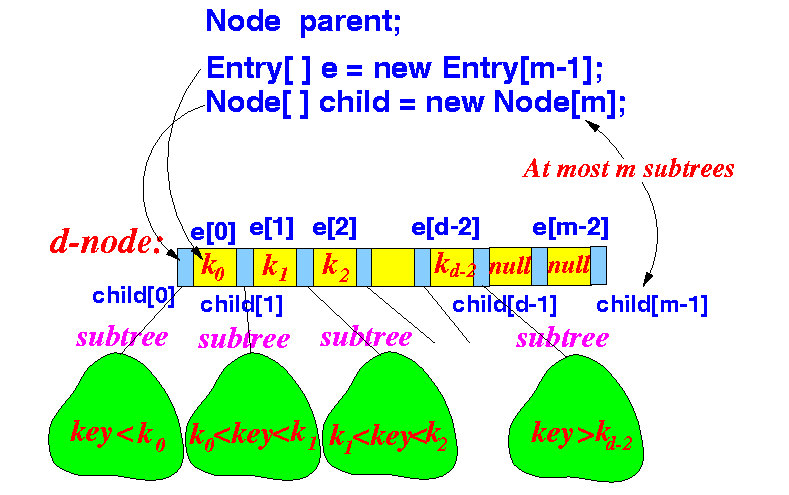
- Allocating the arrays:
- In Java, an array is
allocated
after you define the
array reference variable
- That's why you see:
public class Node { public Entry[] e; // Keys and its associated values public Node[] child; // Subtrees public Node parent; // the parent node ... }
- It's the job of the
constructor to
allocate (create)
the arrays.
Example constructor:
public class Node { public Entry[] e; // Keys and its associated values public Node[] child; // Subtrees public Node parent; // the parent node /* =========================================================== Sample constructor: create a node contains max 4 subtress (and 3 keys) =========================================================== */ public Node() { int i; child = new Node[4]; // 4 subtree pointers e = new Entry[3]; // We need 3 keys to separates the 4 trees /* ------------------------------------ Initialize all references to null ------------------------------------ */ for ( i = 0; i < 3 ; i++ ) { e[i] = null; } for ( i = 0; i < 4 ; i++ ) child[i] = null; parent = null; // Don't forget the parent link... } ... }
- In Java, an array is
allocated
after you define the
array reference variable
- Facts:
- A multi-way tree
is still a
tree
- A tree is just a gerenalization of a linked list
- A multi-way tree
is still a
tree
- So just like a
linked list,
you must remember the
root node
of the multi-way tree
in the data structure:
public class MultiWayTree { /* ================================================= Variable to represent a multiway tree: root ! ================================================= */ public Node root; /* ================================================= Constructor: make an empty tree ================================================= */ public MultiWayTree() { root = null; } .... }
- Example:
Find key 8 in the
multi-way tree:
- Start at the root and
find:
- some entry in the node
contains key 8,
or
- the subtree that may contain key 8
In this case, we go left:
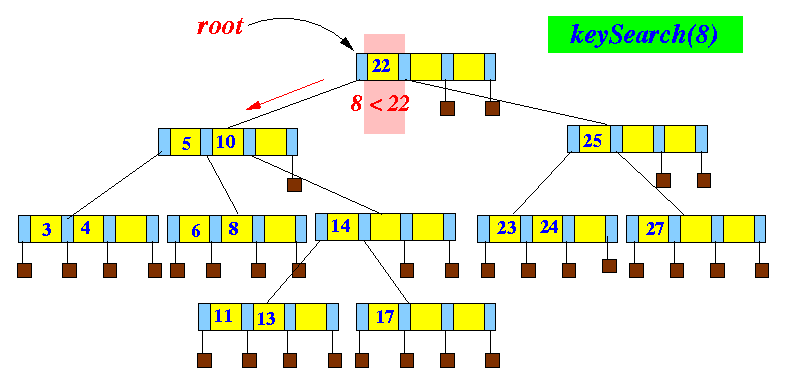
- some entry in the node
contains key 8,
or
- In the next node,
find:
- some entry in the node
contains key 8,
or
- the subtree that may contain key 8
In this case, we go between 5 and 10:
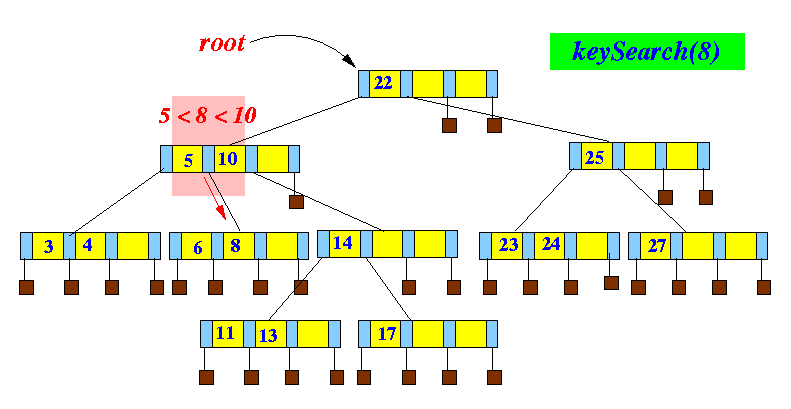
- some entry in the node
contains key 8,
or
- In the next node,
find:
- some entry in the node
contains key 8,
or
- the subtree that may contain key 8
In this case, we found 8:
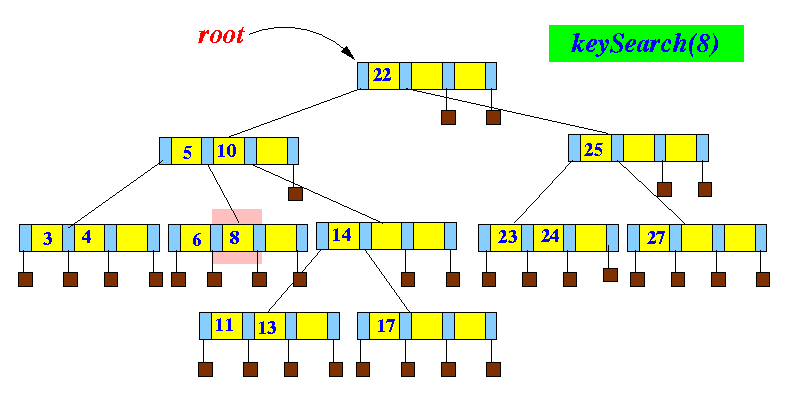
We return the entry found....
- some entry in the node
contains key 8,
or
- Start at the root and
find:
- Example: Find key 7
that is not in the tree
--- preparing for
insertion
:
- Start at
current node
and previous node
at the root and
find in the current node:
- some entry in the node
contains key 7,
or
- the subtree that may contain key 7
In this case, we go left:
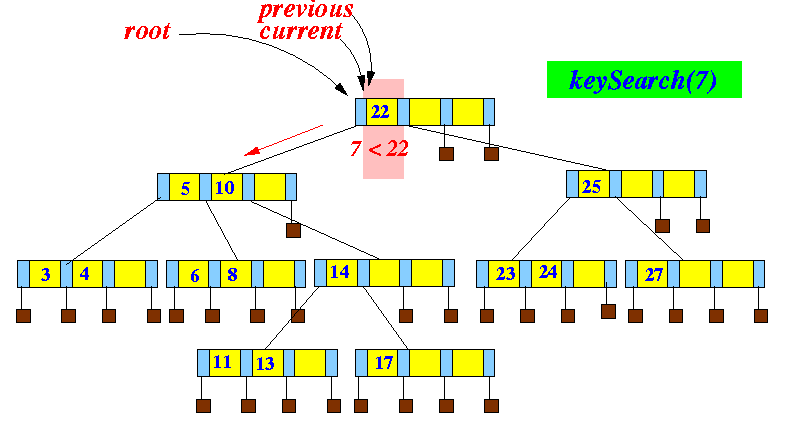
Make previous to point to the current node and use current to descend down the tree.
- some entry in the node
contains key 7,
or
- In the next node,
find:
- some entry in the node
contains key 7,
or
- the subtree that may contain key 7
In this case, we go between 5 and 10:

Make previous to point to the current node and use current to descend down the tree.
- some entry in the node
contains key 7,
or
- In the next node,
find:
- some entry in the node
contains key 7,
or
- the subtree that may contain key 8
In this case, we go between 6 and 8:

Make previous to point to the current node and use current to descend down the tree.
- some entry in the node
contains key 7,
or
- Notice that:

We have:
- current == null !!!
We return null to indicate not found
More importantly:
- We remember the
location of the
last entry (previous)
(Because we may use this node for insertion !!!)
- Start at
current node
and previous node
at the root and
find in the current node:
- A high level description of
the Multi-way tree search algorithm:
Node searchEndPos; // Use an instance variable to hold value longer // Remember that LOCAL variables // ONLY exists INSIDE a METHOD keySearch(k) { Node curr; curr = root; searchEndPos = curr; /* ============================================================ It is important to know that a node looks like this: Node: child[0] e[0] child[1] e[1] ... 0-node: null e[0] null e[1] ... 1-node: impossible !!! 2-node: child[0] e[0] child[1] null ... 3-node: child[0] e[0] child[1] e[1] child[2] null ... ============================================================= */ while ( curr != null ) { searchEndPos = curr; // Remember the last visited node if ( entry[0] != null && k < entry[0].key ) { search in child[0] subtree: curr = child[0]; } if ( entry[0] != null && k == entry[0].key ) { found key k: return entry[0]; } if ( entry[0] is last entry (a 1-node) ) { search in child[1] subtree: curr = child[1]; } ===================================================== if ( entry[1] != null && k < entry[1].key ) { search in child[1] subtree: curr = child[1]; } if ( entry[1] != null && k == entry[1].key ) { found key k: return entry[1]; } if ( entry[1] is last entry (a 2-node) ) { search in child[2] subtree: curr = child[2]; } .... and so on ... } return null; // k not found.... }
- Search algorithm for multiway trees:
(it's called keySearch instead
of findEntry)
/* =============================================================== keySearch(k): find entry containing key k Return value: e[i] if found (e[i].key == k) null if not found AND: searchEndPos = node last visited in search =============================================================== */ Node searchEndPos; // Use an instance variable to hold value longer public Entry keySearch(String k) { int i; Node curr; // current node searchEndPos = root; // searchEndPos = previous node // This variable is NOT local !!! curr = root; while ( curr != null ) { searchEndPos = curr; // Remember the last visited node for ( i = 0; i < d; i++ ) { /* ============================================================ It is important to know that a node looks like this: Node: child[0] e[0] child[1] e[1] ... 0-node: null null null null ... 1-node: impossible !!! 2-node: child[0] e[0] child[1] null ... 3-node: child[0] e[0] child[1] e[1] child[2] null ... ============================================================= */ if ( curr.e[i] != null && k.compareTo( curr.e[i].key ) < 0 ) { curr = curr.child[i]; break; // end to for loop } if ( curr.e[i] != null && k.compareTo( curr.e[i].key ) == 0 ) { return( curr.e[i] ); // found key } if ( i == d-1 || curr.e[i+1] == null ) // e[i] is last value key { curr = curr.child[i+1]; break; // end to for loop } } } return(null); // To make Java happy, it complain of no return value... }
- Example Program:
(Demo above code)

- The Tree24.java Prog file: click here
- The Node.java Prog file: click here
- The Entry.java
Prog file:
click here
- A test program TestProg.java Prog file: click here
How to run the program:
- Right click on link(s) and
save in a scratch directory
- To compile: javac TestProg.java
- To run: java TestProg
Sample output:
2:((m,6),(-),(-)) 3:((ka,6),(l,6),(-)) 1:((kb,6),(-),(-)) 0:((j,6),(k,6),(-)) 1:((h,8),(-),(-)) 2:((g,7),(-),(-)) 0:((e,5),(f,6),(-)) 0:((ba,6),(d,4),(i,9)) 1:((ca,6),(-),(-)) 1:((c,3),(-),(-)) 0:((bb,6),(-),(-)) 3:((b,2),(-),(-)) 2:((ae,6),(af,6),(-)) 0:((ab,6),(ad,6),(ax,6)) 1:((ac,6),(-),(-)) 0:((a,1),(aa,6),(-)) vvvvvvvvvvvvvvvvvvvvvvvvvvvvvvvvvvv Enter a key: h get(h): ((ba,6),(d,4),(i,9)) ---- traverse LEFT subtree of (i,9) ((g,7),(-),(-)) ---- traverse RIGHT subtree of (g,7) ((h,8),(-),(-)) ---- FOUND: (h,8) == get(h) = 8 vvvvvvvvvvvvvvvvvvvvvvvvvvvvvvvvvvv Enter a key: x get(x): ((ba,6),(d,4),(i,9)) ---- traverse RIGHT subtree of (i,9) ((ka,6),(l,6),(-)) ---- traverse RIGHT subtree of (l,6) ((m,6),(-),(-)) ---- traverse RIGHT subtree of (m,6) ===== Not found... Search ended at node: ((m,6),(-),(-)) == get(x) = null
- Goodrich used one single loop
to accomplish the entire algorithm
and made it unnecessaily complex
(which he did throughout his whole text book).
His loop is complex because he handle 2 things at the same time:
- Iterate through
all the subtrees
- Find out which subtree is the last subtree in the node
- Iterate through
all the subtrees
- I would split up the 2 tasks and
use 2 loops:
/* =============================================================== keySearch(k): find entry containing key k Return value: e[i] if found (e[i].key == k) null if not found AND: searchEndPos = node last visited in search =============================================================== */ Node searchEndPos; // Use an instance variable to hold value longer public Entry keySearch(String k) { int i; Node curr; // current node int N; // Number of entries boolean found; // Did we find the subtree already ? searchEndPos = root; // searchEndPos = previous node // This variable is NOT local !!! curr = root; while ( curr != null ) { searchEndPos = curr; // Remember the last visited node /* =========================================================== Find out how many entries are stored in the current node =========================================================== */ for ( N = 0; N < d; N++ ) if ( curr.e[N] == null ) break; // last entry found found = false; // Flag whether we need to take the right most subtree for ( i = 0; i < N; i++ ) { if ( k.compareTo( curr.e[i].key ) < 0 ) { curr = curr.child[i]; // Go to the left subtree found = true; // We found the subtree ! // DO NOT take the right most subtree break; // end to for loop } if ( k.compareTo( curr.e[i].key ) == 0 ) { return( curr.e[i] ); // found key } } if ( !found ) curr = curr.child[N]; // Go to the right-most subtree // because no left tree was found } return(null); // To make Java happy, it complain of no return value... }
- Example Program:
(Same DEMO, but using my own keySearch algorithm)

- The Tree24.java Prog file: click here
- The Node.java Prog file: click here
- The Entry.java
Prog file:
click here
- A test program TestProg.java Prog file: click here
How to run the program:
- Right click on link(s) and
save in a scratch directory
- To compile: javac TestProg.java
- To run: java TestProg